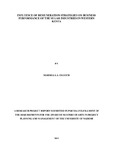| dc.description.abstract | The purpose of this study was to investigate the influence of remuneration strategies on the
business performance of Kenya sugar industries in western Kenya region. The study was to
be guided by the following objectives: To determine how total reward strategy influences the
performance of the sugar industries in western Kenya, To assess how performance based
reward strategy influences the performance of sugar industries in western Kenya, To
establish how competence based reward strategy influences the performance of sugar
industries in western Kenya and, To find out how traditional reward strategy influences the
performance of sugar industries in western Kenya. The study adopted a descriptive survey
design and applied both qualitative and quantitative approaches to research. The target
population were full time staff from the four sugar industries in western Kenya: Sony,
Mumias, Muhoroni and Nzoia. The total population is 1,318 ,using Krejcie and Morgan
(2007) sample determination formular, the sample is determined as 274 .Stratified random
sampling method was used to select the respondents. The test retest technique was used to
ensure reliability of research instruments while validity was ensured through pilot testing and
reviews. Data was analyzed through descriptive (frequencies and percentages) and inferential
statistics (hypothesis testing using chi-square), the findings were presented as frequencies and
percentage tables and cross-tabulations. Data analysis was be aided by a computer package;
Statistical Package for Social Sciences (SPSS). The findings were that financial reward was
preferred to non-financial rewards in the sugar. Majority of the respondents at 136(49.60%)
had financial rewards included in their pay, 70(25.50%). The most common financial reward
among the industries were basic pay given to 268(97.8%), leave allowance given to
258(94.2%) and pension allowance given to 224(81.8%) respondents. There was a strong
significant relationship between total reward and business performance; p-value
(N=274,C.I.=0.05) = 0.000.Fixed pay component is common in the sugar industry as said by
237(86.50%) of the respondents. It was established that there was strong significant
relationship between performances based pay system and business performance; p-value
(N=274,C.I.=0.05) = 0.000.Competency based reward system is minimally applied by the
sugar industry, majority of the respondents at 156(56.90) were not paid based on their ability
to undertake an assignment. There was a strong significant relationship between competency
based pay system and business performance; p-value (N=274,C.I.=0.05) = 0.000.Traditional
pay strategy is the most used in the sugar industry; most respondents at 236(86.1%) had their
pay based on the job done. It was established that the relationship between traditional pay
system and business performance was weak and insignificant, p-value (N=274, C.I.=0.05) =
0.211.It was concluded that the companies have not embraced total reward strategy; as a
result its implementation has been done in piecemeal hence ineffectiveness in terms of
enhancing business performance. Performance based reward strategy has not been
consistently applied by the firms in the sugar industry; consequently its outcomes have not
been realized. Competency based reward system is minimally applied by the sugar industry
and the competency bands are rarely applied in the sugar industry. Traditional pay strategy is
the most used in the sugar industry. The researcher recommends that: There is need for
company specific assessment on the suitable remuneration strategies for adoption and
implementation for better business performance outcomes, There is need for keener thought
and consistency in the application of the remuneration strategies chosen by the companies
and there is need for greater participation of staff in the formulation and implementation of
the remuneration strategies | en_US |

